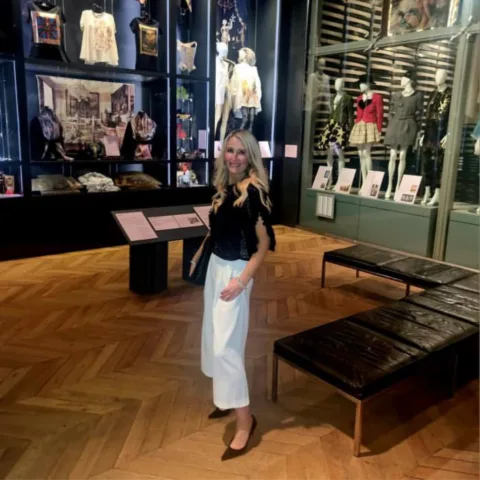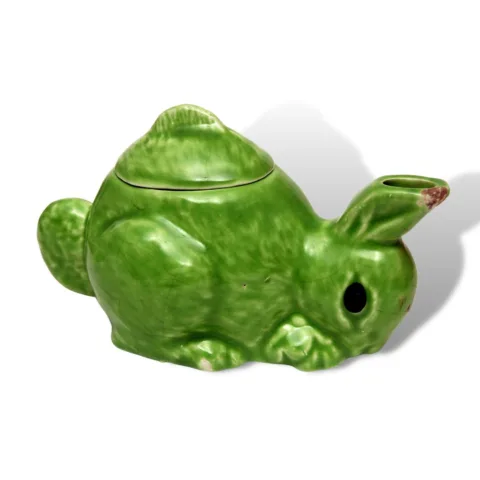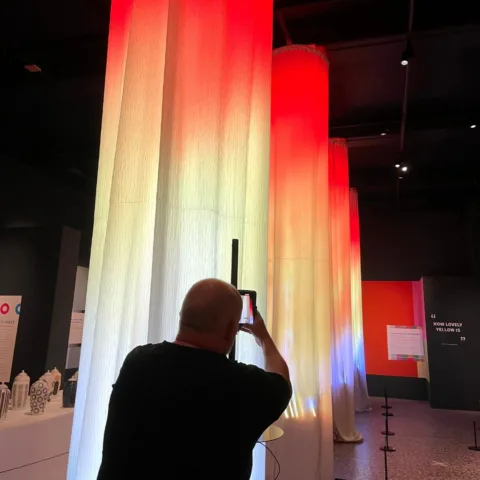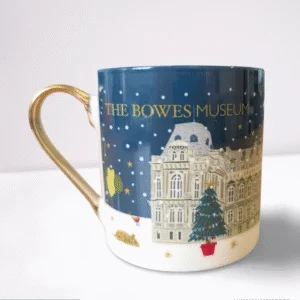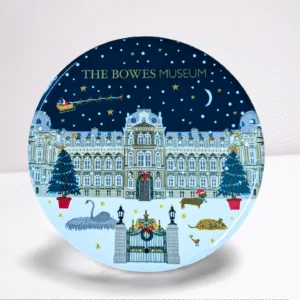The Bowes Museum Blog

Dining [and smashing china] with the Bowes
The Bowes Museum is not meant to be, and never has been, a museum of the Bowes family. Despite the fame of the relationship with the Queen Mother [Elizabeth Bowes Lyon, a distant cousin of our founder John Bowes], any family possessions went back to the Bowes Lyon family on John Bowes’ death in 1885 [he was judged illegitimate and so had only a life interest in their estates). Yet some objects crept in, partly by bequest of his cousin Susan Davidson, and partly by deliberate purchase and acquisition in the 20th century [on the grounds that their better purchases rank as first class examples of English decorative arts].

The house at Gibside today
When I first saw the ceramics collections at The Bowes Museum, it was immediately apparent that the extensive ceramic collection here had large groups of plates and other items in sets in a way that you don’t normally find in public museums. Most museum collections [and collectors] select or acquire one of each group or service in order to avoid duplication and waste storage space. The Bowes Museum has eight Chelsea botanical plates, four Chelsea vine leaf dishes, four similar from Worcester or Bow, enough to make one think that these were the remains of someone’s dinner or dessert service. We have used these semi-complete sets in displays on food history and table layout, most notably highly influential ‘The Tempting Table’ in conjunction with food historian Ivan Day in 1994.
These pieces all shared a provenance from Susan Davidson, and as her bequest to John Bowes included specifically a teaset and inkstand from their grandmother Mary Eleanor Bowes, it made me wonder if the family china [or porcelain as the specialists prefer] had descended down the female line. This appeared to be confirmed when I found the County Record Office accounts for Mary Eleanor’s mother’s purchases of china in London. This included payments for twelve Chelsea dishes ‘with plants’ in 1758-59, and four Chelsea vine leaf dishes in 1760. These would have been supplementary to the silver that her husband had ordered for the dinner service on their marriage in 1743.

Dessert plate,marked with a red anchor. Soft-paste porcelain, painted in enamel colours and gilt, Chelsea, c1758-59, X.3371
Probably from two sets of plates bought by Mrs. Bowes in London on March 1 1758 (Paid at the Chelsea sale for 12 plates with Plants £5,7s) or April 10 1759 (Paid at the Chelsea sale for 12 Plates with Plants £5, 17s,6d)
What proved my supposition was when the National Trust excavated rubbish pits at the Bowes’ family home at Gibside, and found fragments of fine quality 18th century porcelain of a kind never before found in any archaeological dig. It must be remembered that people throw away things of little value or beyond repair. The fragments included a nearly complete Derby figure, fragments of at least one Chelsea plate, and numerous bits of Chinese porcelain and later English earthenware which would have been in daily use at Gibside.

Dessert dish showing old repairs. Soft-paste Porcelain, painted in enamel colours and gilt Chelsea, c.1760 X. 4456
Probably one of four bought by Mrs. Bowes in London in 1760 on March 28th ‘Paid at a sale for 4 Chelsea Vine Leaf Dishes £2.11’
The rubbish pit was an old outside lavatory or ‘netty’ that was sealed over about 1820; the objects must have been used and broken by John Bowes father, the 10th Earl of Strathmore. He was unmarried and no doubt had some wild parties with his gentleman friends! More pragmatically, Chelsea and Derby porcelain of the 18th century would have had little value in the early 19th century; it was only after about 1830 that people began to value their grandparents’ items as ‘antiques’ in the modern manner, and treat them carefully. Arguably, it is this kind of item that forms the basis of modern museum ceramics collections, which I suspect are full of everyone’s ‘best’ china that is used carefully and then becomes a saleable or collectable ‘antique’ after fifty years or so.

The remains of the ‘netty’ (outside lavatory) at Gibside on the slope towards the river. It was last used in about 1820 and the superstructure was demolished in 1854
So what of some of items already in the collections, some with heavy old ‘riveted’ repairs? I think these must have been done in the 18th century, when you needed four dishes to make up a set on the table. They brutally disfigure the item, but they make the object usable in the days when complete sets of china were laid out on the dinner or desert table. The strange wirework rivets on the Chelsea vine dishes must have been done in the 18th century, when the porcelain was still usable, but before it has lost so much intrinsic value that it would have thrown down the ‘netty’ in the early 19th century. We don’t tend to show damaged items in museums, but such items can be valuable in store, as a means of piecing together the history of a collection and its use through the centuries.

Fragments of a Chelsea botanical dessert dish found at Gibside
The porcelain fragments from Gibside are on display at The Bowes Museum in the exhibition ‘Dining with the Bowes’ in the Ceramics Galleries until April 2017.
By Dr Howard Coutts, Keeper of Ceramics
